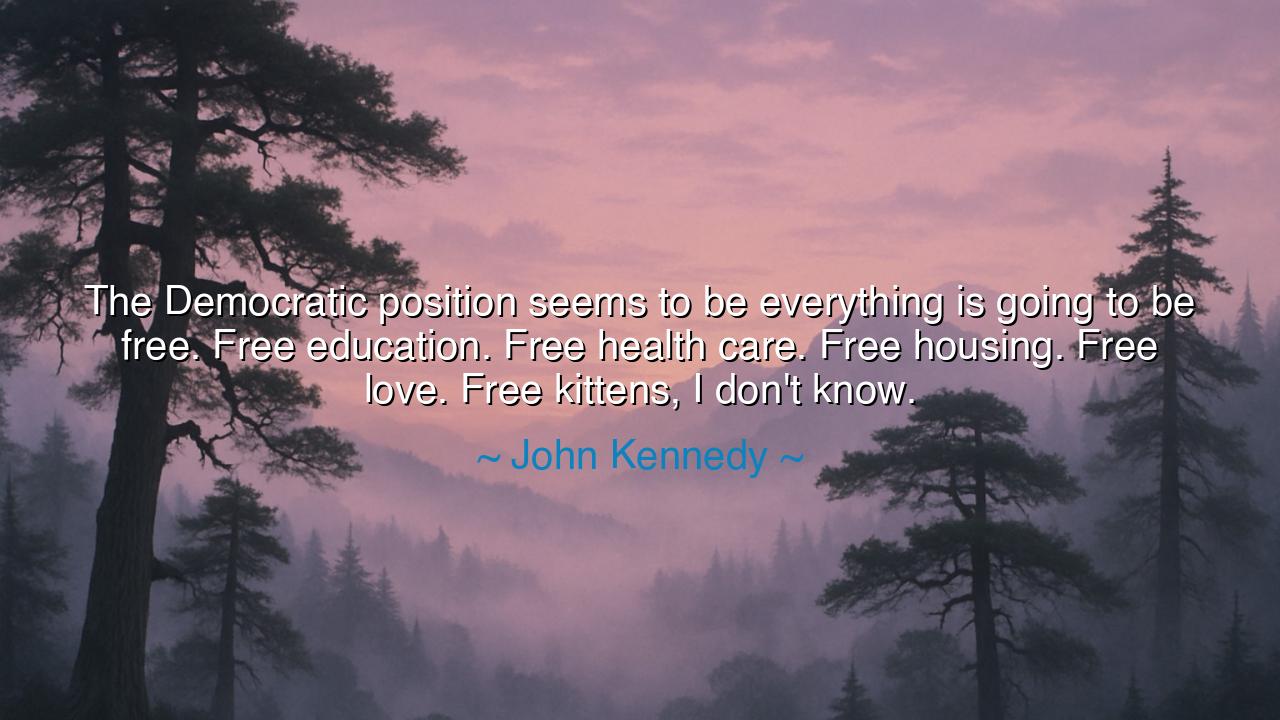
The Democratic position seems to be everything is going to be
The Democratic position seems to be everything is going to be free. Free education. Free health care. Free housing. Free love. Free kittens, I don't know.






The words of John Kennedy, “The Democratic position seems to be everything is going to be free. Free education. Free health care. Free housing. Free love. Free kittens, I don’t know,” are spoken in jest, yet behind their humor lies a profound tension that echoes through every age of civilization—the struggle between idealism and realism, between the dream of a compassionate society and the hard truth that nothing of worth is ever truly without cost. Though light in tone, Kennedy’s words carry a deeper wisdom: that freedom and generosity, noble as they are, must walk hand in hand with responsibility and effort, or else both crumble into illusion.
At the surface, this quote seems merely a playful jab at political idealism. Yet if we listen as the ancients would, we hear within it a philosophical challenge. For as old as humanity’s dream of equality is the danger of dependency. Every civilization has wrestled with the same question: can a people remain strong if they come to expect all gifts without labor? The Roman philosophers warned that a republic dies not from conquest but from the decay of virtue, when citizens seek comfort instead of contribution. Kennedy’s wit strikes at this eternal paradox—that while the heart yearns to give freely, the world demands that each gift be paid for in some measure, whether through work, sacrifice, or shared duty.
The origin of this quote lies in the political debates of Kennedy’s time, when visions of social welfare, universal care, and equality stirred both hope and controversy in America. As a statesman, Kennedy stood between extremes: neither blind to suffering nor naïve about human nature. His remark—half humorous, half cautionary—was not a rejection of compassion, but a reminder that prosperity and charity must be built upon discipline, production, and purpose. His jesting tone hides a serious truth: that the wealth which funds generosity must itself be created, and that moral intention without practical wisdom can collapse into chaos.
History itself testifies to this balance. In the early years of the French Revolution, the cry for equality and freedom rose like fire. Bread, land, education, and hope were to be shared by all. But in their rush to make everything “free,” the revolutionaries forgot that abundance must be sustained by order and labor. What began in idealism ended in blood, because a dream without structure becomes a storm. Conversely, nations that have endured are those that learned to temper compassion with stewardship, generosity with accountability, and freedom with duty.
Kennedy’s remark, though framed in humor, also celebrates the human spirit’s yearning for kindness. His jest about “free kittens” mocks excess, not empathy. It reminds us that while generosity ennobles society, it must be guided by wisdom. The true moral aim is not to make life effortless, but to make opportunity universal—to build systems where education, health, and shelter are accessible, yet sustained by the labor and creativity of the people themselves. For as any ancient teacher would say, the gift that costs us nothing often teaches us nothing.
In the rhythm of his words lies a warning to future generations: beware of comfort that dulls the soul. To receive without gratitude breeds entitlement; to give without limits breeds ruin. Just as a parent must teach a child not only to eat but to work for the harvest, so must a society teach its citizens that freedom flourishes only when each person carries their share of the common burden. When the scales between giving and earning fall out of balance, even the noblest ideals can turn to folly.
The lesson, then, is not that we should deny generosity, but that we must anchor it in realism. Let education be made accessible, but let it also inspire discipline. Let health care be humane, but let each person cherish life enough to care for their own well-being. Let love be given freely, but let it remain grounded in respect and virtue. The harmony of a moral society depends on both open hearts and steady hands.
And so, as the ancients might counsel: seek not a world where all things are free, but a world where all people are free to strive. For true happiness is not found in what is given, but in what is earned with honor. A nation, like a man, prospers not when it receives endlessly, but when it creates abundantly and shares wisely. Let laughter, like Kennedy’s, remind us always that generosity without wisdom is hollow—but that wisdom without compassion is lifeless. The balance of both is the foundation of civilization itself.






AAdministratorAdministrator
Welcome, honored guests. Please leave a comment, we will respond soon